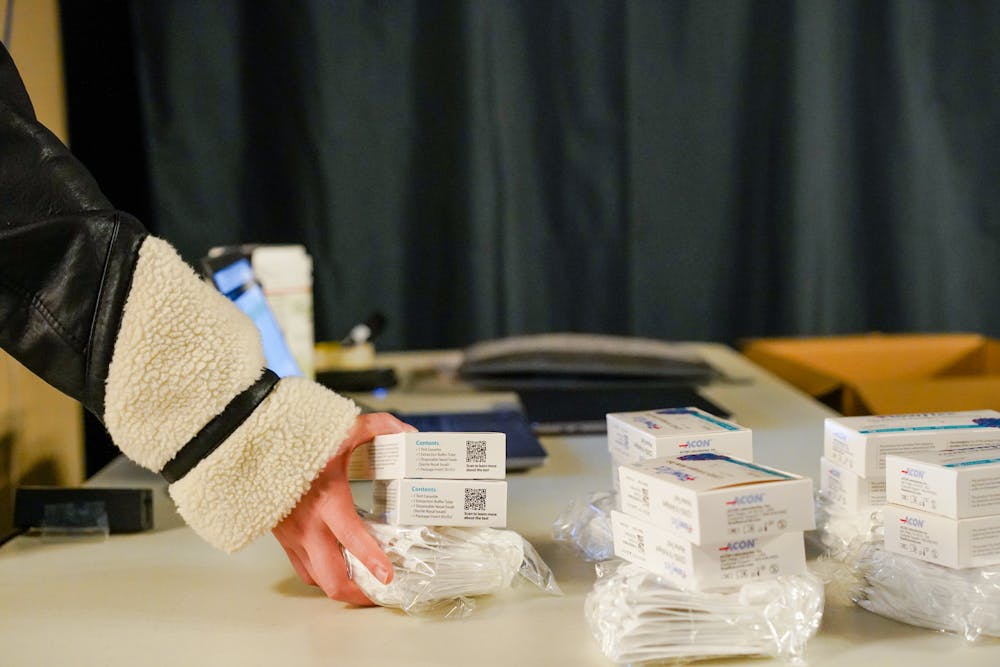The University shifted today to optional masking for fully-vaccinated community members in most locations on campus and optional testing for fully-vaccinated undergraduate students, The Herald previously reported. Guidance on COVID-19 precautions from the Centers for Disease Control and Prevention were among the “most important” factors the University considered before making the change, said Executive Vice President for Planning and Policy Russell Carey ’91 MA’06.
The University also relied “heavily on campus expertise,” including from Executive Director of Health and Wellness Vanessa Britto MSc’96 and other faculty in the medical school, Carey told The Herald.
“Our health services leadership felt really comfortable going to both optional testing for undergraduates and mask optional with the exceptions that we provided,” Carey said.
The change, which Carey said was “best for Brown,” followed a review of COVID-19 case numbers on campus, in Providence and in the greater Rhode Island community, according to Carey.
While students are still required to wear masks if asked by professors or presenters, “most faculty and students would agree that the classroom experience is better without a mask,” Carey said.
“The ability to see each other more directly and particularly in a classroom setting is really important, so we wanted to get to that point as quickly as we felt it was safe to do so,” he added.
Brown shuttles will continue to require masking, in accordance with federal regulations that still mandate masking on public transportation including buses, trains and airplanes, according to Carey.
Healthcare facilities such as the Alpert Medical School and testing centers on campus will also still require masking. “People may be going to get a test when they feel symptomatic,” which is why masking is required at the testing site, Carey said.
The decision to switch to optional masking in most locations on campus was also made while “paying very close attention (to) what I would describe as Ivies plus — all of our Ivy peer institutions, (the) Massachusetts Institute of Technology, Stanford University, (the) University of Chicago — (which) are places that have a lot of similarities to us even if they're in different regions of the country,” Carey said.
The University was also aware of the policies of other institutions in Rhode Island, Carey said, including Providence College, which went mask optional a month ago.
“Institutions, including Brown, have to make decisions that are best for their institution and particularly based on what they're seeing on their campuses,” Carey said. “We certainly do pay attention to what other (institutions) are doing, (but) we're not driven by it or bound by it.”
“It is informative and we learn a lot from our peer experiences,” he added. “The experience of other institutions can be really informative, but it's another piece of information, not a determinant.”
Despite masks becoming optional in most locations on campus, all community members must continue to “always carry a mask,” Carey said. “There will be settings that are unpredictable and where wearing a mask is absolutely either appropriate or required, so just being in the habit of carrying a mask … at all times is really important.”
People should also continue to pay attention to symptoms and stay home, test and seek medical advice if they feel symptomatic, according to Carey.
While he said that there is always a possibility that the University would reinstate the mask mandate, given “everything we're seeing and hearing and being told, it seems less likely, but we won’t rule anything out,” Carey said.
“I would emphasize that we'll take the steps that are necessary to keep the campus healthy and safe,” he added.
During the week of March 3 to 9, 38 students reported positive COVID-19 test results and approximately 31 students were in designated on-campus or off-campus isolation housing, according to a March 11 Today@Brown announcement. Five employees reported positive COVID-19 results in the same time frame. As of March 9, the University has distributed 39,599 test kits in total, according to the announcement.
Rapid antigen tests will continue to be available through the end of March and community members will now be able to pick up four tests at a time rather than two, according to Carey. Testing site staffing will remain the same through the end of March, he said.
After the end of spring break in early April, all students will be required to test on day one and day three after returning to campus, according to Carey. Community members should also wear a mask while traveling by train or airplane, pay attention to symptoms, “bring some tests with (them) and just generally be cautious particularly because other parts of the country and other parts of the world are not all the same” in terms of COVID-19 cases, he added.
“We're balancing people's comfort and confidence levels,” Carey said. This is a “transition and adjustment for everyone … and we know that there's anxiety associated with making these changes and we want to be respectful of that.”
Additional reporting by Haley Sandlow
Gabriella was a Science & Research editor at The Herald.





